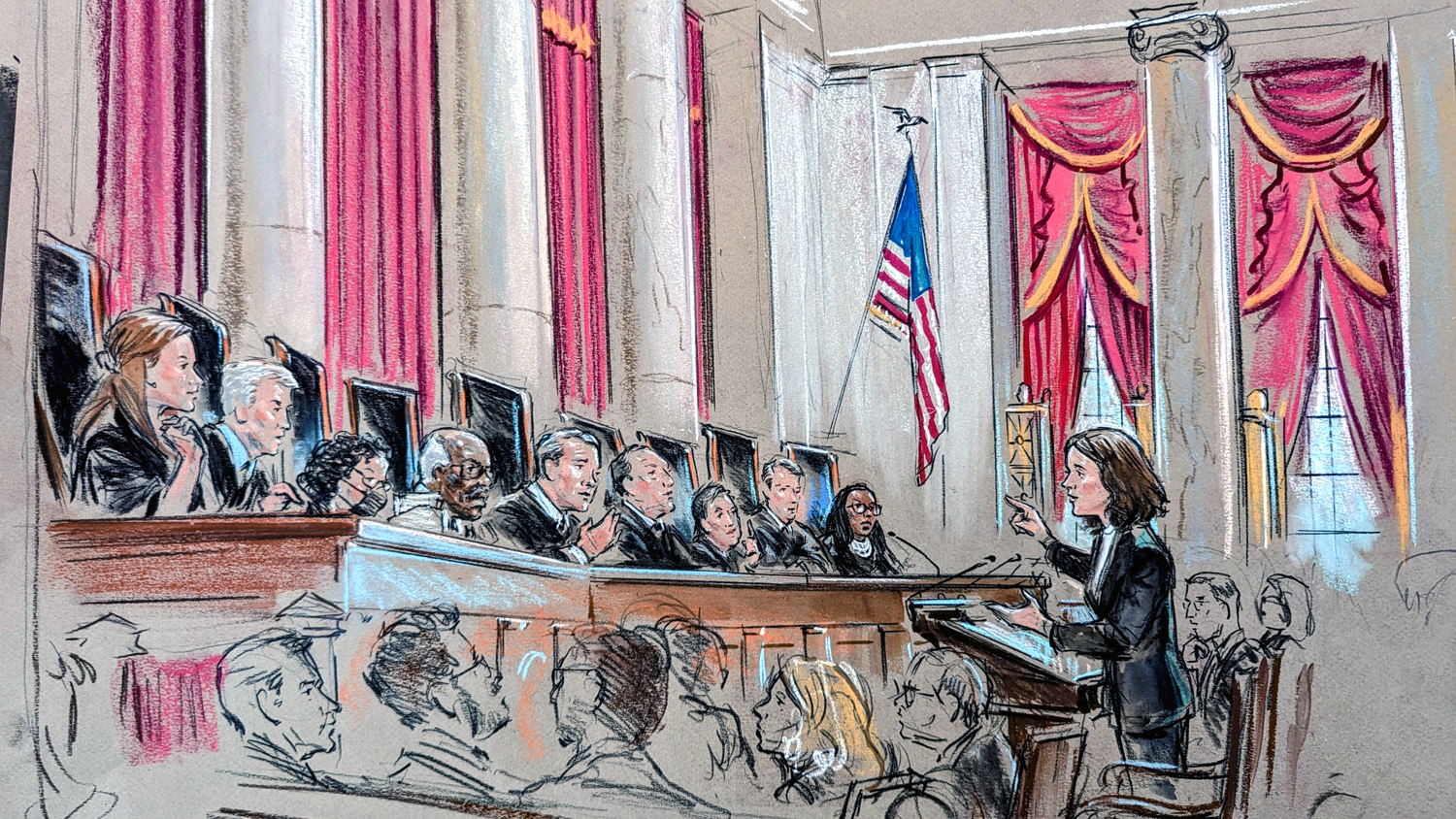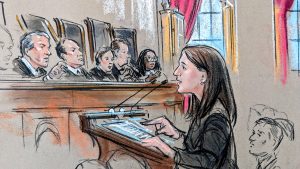Justices appear likely to side with homeowner in foreclosure dispute


Geraldine Tyler, a 94-year-old grandmother, lost her Minneapolis condo when she failed to pay the property taxes for several years. Tyler does not dispute that Hennepin County could foreclose on the $40,000 property and sell it to obtain the $15,000 in taxes and costs that she owed it. But she argued that the county violated the Constitution when it kept the $25,000 left over after the property was sold. After roughly 100 minutes of debate on Wednesday, a majority of the justices seemed inclined to agree with her.
Representing Tyler, lawyer Christina Martin argued that the county had violated the Constitution’s takings clause, which bars the government from taking private property for public use without adequately compensating the property owners. The county, Martin said, could have followed a more traditional path and taken Tyler’s condo, sold it to pay Tyler’s debts, and then refunded the remainder to Tyler. But instead, she emphasized, the county kept the profits too. And if the county’s actions don’t violate the takings clause, Martin continued, at the very least they violate the Eighth Amendment’s ban on excessive fines, because the county’s seizure of Tyler’s property to punish her for not paying her property taxes on time goes well beyond compensating the government for any loss.
The Biden administration filed a “friend of the court” brief in which it agreed with Tyler that the county’s actions violated the takings clause. The justices pressed both Martin and Assistant to the Solicitor General Erica Ross, representing the Department of Justice, on potentially significant differences in the reasoning on which Tyler and DOJ relied to reach that conclusion – specifically, what is the property interest at stake, and when does the takings claim arise?
Ross contended that the property interest is the title to the condo, which is “taken” when the county seizes the title for failure to pay taxes, rather than when the condo is later sold.
Martin characterized her position – which focused on Tyler’s equity in her condo as the property interest that is seized when the government sells the condo and keeps all of the proceeds – as simply another way of looking at the same question, but Justice Sonia Sotomayor resisted that argument, telling Martin that there are “huge” implications to the different arguments. “These are big questions,” Sotomayor said, asking Martin why the court should address the federal government’s argument at all.
Sotomayor was skeptical of the government’s position, telling Ross that she was “throwing a bomb into 250 years of history with respect to delinquent” taxes and property sales. If the court were to define the point at which the state takes title to the property as the time at which the taking occurs, Sotomayor posited, then the state is effectively required to become the seller’s real estate agent. The Biden administration, Sotomayor complained, is putting the justices in “a much more radical position.”
Justice Amy Coney Barrett was direct in her questioning. In light of Tyler and the federal government’s different stances, she asked Ross, how should the justices resolve the case?

Ross was equally straightforward, referring back to the government’s brief. The taking occurs, she said, when the county seizes the title to property and there is no mechanism for the property owner to recover the excess value of the property. The court, she urged, should vacate the decision by the U.S. Court of Appeals for the 8th Circuit.
Perhaps because the justices seemed likely to rule for Tyler on her takings clause claim, they spent relatively little time on her excessive fines claim. But Justices Neil Gorsuch and Ketanji Brown Jackson signaled that they believed that the county’s actions also violated the excessive fines clause.
Gorsuch noted that the district court’s decision, which the 8th Circuit affirmed, concluded that the county’s failure to refund the $25,000 to Tyler wasn’t a fine because the primary purpose of the state’s home-forfeiture scheme is to compensate the government for lost revenue; moreover, the lower court reasoned, Tyler was given many chances to pay what she owed. “I don’t see how,” Gorsuch observed, “how that lines up under our case law as anything other than a fine.” Gorsuch later added that in other contexts, the usual rule is that “that you only take what you’re owed.” Why, Gorsuch queried, doesn’t that show that the scheme in this case was intended to be punitive?
Jackson echoed Gorsuch’s thoughts, noting that the home-forfeiture scheme “feels very punitive” in light of the potential for “massive differences” in how much equity the county could retain, based solely on the particular value of a home. And Jackson pointed to the county’s emphasis on Tyler’s opportunities to pay what she owed the county before her condo was seized as evidence of the county’s efforts to blame, and therefore punish, Tyler.
Representing Hennepin County, Neal Katyal described Minnesota’s home-forfeiture scheme as falling within a “long tradition.” When a state extinguishes a property right because the property owner has failed to comply with reasonable conditions on ownership, Katyal contended, there is no taking. Tyler’s theory, he stressed, would declare many state statutes unconstitutional and would turn states into real estate agents.
Katyal urged the justices to focus on a threshold question in the case. The case should be thrown out without a ruling on the merits, he argued, because Tyler does not have a legal right to sue, known as standing. Although she contends that the property interest that was taken from her was her equity in her condo, Katyal emphasized, her complaint does not actually allege that she had any equity in her condo, because (as the county’s brief explained), there was also a mortgage for nearly $50,000 and a homeowners’ association lien for nearly $12,000 on the property.
But the justices did not seem particularly interested in, or persuaded by, Katyal’s arguments on the standing question. (Indeed, they did not ask Martin about standing at all.) Instead, they focused on the merits of Katyal’s arguments. Katyal insisted that the home-forfeiture scheme was not a “moneymaker for the government.” Rather, he said, it simply balances the rights of delinquent taxpayers like Tyler against the rights of other taxpayers. Governments have concluded, he told the justices, that a scheme like this one is the best way to encourage taxpayers to sell their land if they can’t pay their property taxes. If they don’t sell the property, he explained, the government will sell it for them, and the former property owners will lose out.
Several justices pressed Katyal on the limits of his theory. Justice Elena Kagan outlined a scenario involving a $5,000 tax debt and a $5 million house. Could the government sell the house and keep the surplus?

When Katyal agreed that the government could do so in this and other similar scenarios, Chief Justice John Roberts chimed in. “If that’s all true,” Roberts queried, “what’s the point of the takings clause?”
Some justices saw a disconnect between Katyal’s theory and how the government deals with takings and forfeitures in other contexts. When Katyal agreed with Kagan that the government could not seize an entire bank account containing $100,000 to pay a $10,000 income tax debt, he explained that the main difference was “mostly historical,” although he allowed that the difference between real property – that is, land and buildings – and other items of property could also play a role.
That distinction left Kagan befuddled. “If the mind rebels,” she said, at the idea that the government can seize a $100,000 bank account to pay a $10,000 tax debt, why should the government be allowed to rely on 13th- or 18th-century history to do essentially the same thing with real estate?
Justice Brett Kavanaugh agreed. “Why,” he asked Katyal, “would we read the Constitution to disfavor real property? That seems counterintuitive.”
Roberts suggested that any difference between real property and other forms of property would lead to the “exact opposite” conclusion from Katyal’s theory. The Supreme Court’s cases, Roberts said, characterize property as “essential to the preservation of liberty.” To say that money is more deserving of constitutional protection than property, Roberts observed, “has it exactly backwards.”
Jackson chimed in. If Tyler had instead sold her condo herself to pay her tax debt, could the county seek to recover the $25,000 surplus? When Katyal responded that it could not, Jackson appeared dubious about his efforts to distinguish her hypothetical from Tyler’s case. Katyal, Jackson said, “seemed to suggest that just because [Tyler] owes this money, the government is entitled to extinguish her entire right in the property and any money that is incurred above the tax debt.”
In her rebuttal, Martin warned the justices that, on the county’s theory, there were virtually no limits to what it could seize, no matter how small a taxpayer’s debt was. She cited two examples in which the government had pocketed a disproportionately large surplus after a foreclosure – a $25,000 home in Michigan that was sold for an $8 tax delinquency, and a case in Nebraska in which an “elderly widow in a nursing home lost a million-dollar farm over a relatively small debt.” Arguing that the Constitution does impose limits on the county, she urged the justices to reverse the 8th Circuit’s decision and send the case back to the lower courts – a result that seemed likely to have support from a majority of the court.
A decision in the case is expected by summer.
This article was originally published at Howe on the Court.
Posted in Merits Cases
Cases: Tyler v. Hennepin County, Minnesota